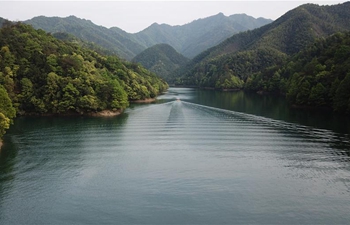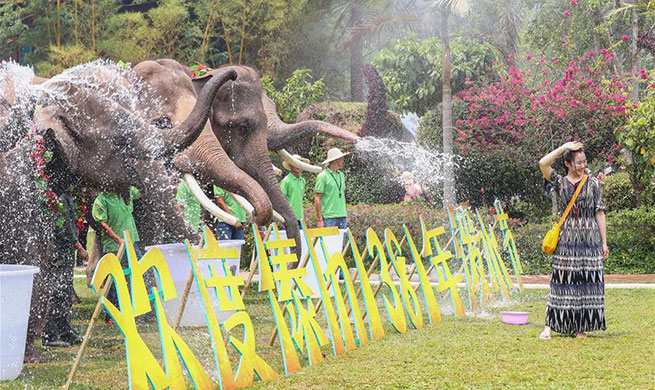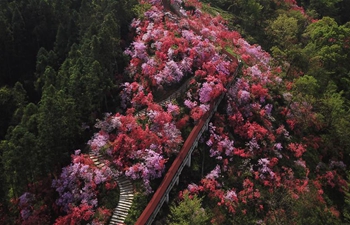URUMQI, April 15 (Xinhua) -- Home to endangered species such as Tibetan wild yak and wild ass, the Altun Mountains in northwest China's Xinjiang Uygur Autonomous Region were designated a national nature reserve in the 1980s.
However, over the past decades a large number of poachers, gold-rushers and hardcore adventurers have made their way to large swathes of uninhabited land to seek fame and fortune, damaging the fragile environment.
Today, years after China banned unauthorized entry to the region, authorities are managing to keep the trespassers out of Altun and restore the natural environment.
POACHERS
Suleiman, a driver for the management bureau of Altun Mountain National Nature Reserve since 1984, is no stranger to bloody scenes of poachers slaughtering Tibetan antelope, also known as "chiru."
"Poaching used to be rampant in Altun, which is close to Hoh Xil," Suleiman said, referring to a neighboring nature reserve where poaching of the Tibetan antelope stirred a national outcry.
In the 1990s, a shawl called "shahtoosh" made from the wool of the endangered Tibetan antelope became popular. The expensive shawl immediately lured people into the illegal business of poaching Tibetan antelope.
"In the winter of 1995, after receiving tips, we drove into the reserve to pursue a group of poachers armed with rifles," Suleiman said. "Fortunately, we caught them off guard without exchange of fire."
"In the end, we captured 12 poachers and seized hundreds of antelope hides."
In 1999, the Chinese government launched a crackdown on poaching of the antelope. Through coordinated efforts at home and abroad, products made from the wool of the Tibetan antelope were included in the international ban on wildlife trade. Poaching of the Tibetan antelope was effectively contained.
Today, the number of Tibetan antelopes in Altun has risen to more than 43,000, compared with about 21,000 to 29,000 in 1999.
GOLD-RUSH
As early as the Qing Dynasty (1644-1911), mining started in the mountains of Altun, which means "gold" in Uygur.
At the end of the 1980s, when news spread that gold was in Altun, a large number of fortune-seekers flooded the mountains to search for gold.
"They arrived by tractor, with all kinds of mining equipment. At the peak, there were 10,000 to 20,000 people living in a single ravine," said Zhang Xiang, deputy director of the reserve management bureau.
To curb the frenzy, China's State Council launched a crackdown on the illegal mining and ordered gold-seekers to move out of Altun in the early 1990s.
"In the operation, more than 30 guns were seized and over 4,000 table concentrators for gold selection destroyed," Zhang said, adding that the illegal mining was brought under control by 1993.
However, mining started again after 2000 in the resource-rich region where over 50 kinds of minerals had been discovered.
"Heavy-duty trucks with 'legal' procedures came in and out of the reserve," said Li Huan, an official of the reserve management bureau.
In 2017, central authorities sent an inspection group to Xinjiang as part of a campaign to tighten environmental supervision. A year later, nine firms in Altun suspended mining activities to restore the environment.
ADVENTURERS
Shang Peng, the deputy head of a checkpoint of the reserve, did not expect China's automobile boom to impact a region as remote as Altun.
Over the past decade, illegal trespassing has been on the rise in Altun. From 2011 to 2018, reserve authorities intercepted nearly 20 groups of adventurers who were about to drive into protected areas.
"Some car enthusiasts and off-roaders posted information online to recruit fellow adventurers, in hopes of seeking what they describe as an exciting experience in no man's land," Shang said.
Xu Junquan, a researcher with the reserve management bureau, said off-road driving across the reserve greatly harmed plants, which grow slowly and have a long cycle of natural recovery.
"There is a large desert in the protected area. Once the plantation is reduced, the desert will spread," Xu said. "That's why tourism has never been allowed in the reserve."
In 2017, the reserve began to implement a ban on unauthorized entry to protect the fragile ecological environment and the wildlife.
But Shang said some adventurers still managed to trespass into the reserve and when they were in danger, often had to ask local authorities for help through satellite phones.
"Do not come to the uninhabited area of Altun. The journey is not as romantic as the movies depict," Shang said.

















